In The Shadow Of ‘Oppenheimer’: ‘A Compassionate Spy’ Reveals American Scientist’s Espionage In Midst Of Manhattan Project
- Oops!Something went wrong.Please try again later.
- Oops!Something went wrong.Please try again later.
- Oops!Something went wrong.Please try again later.
- Oops!Something went wrong.Please try again later.
- Oops!Something went wrong.Please try again later.
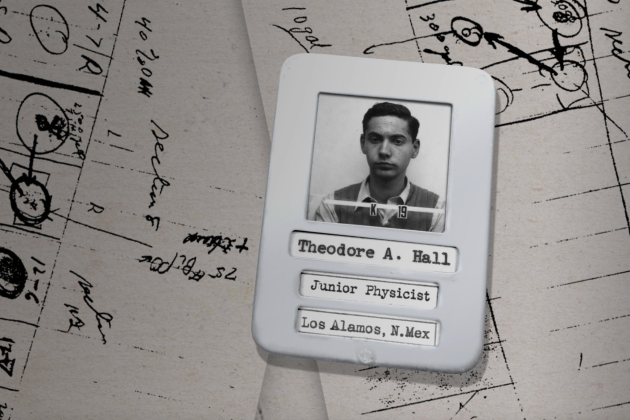
Christopher Nolan’s mega-hit Oppenheimer features dozens of historical characters, but among them you won’t find Ted Hall. And yet Hall, who went to work on the Manhattan Project as a teenage wunderkind physicist, occupies a significant place in the overall story. As a fresh-faced and idealistic youth, he shared top secret details of the atom bomb’s design with Soviet agents — but he was never prosecuted for it.
The incredible tale of Hall’s act of espionage, and the moral considerations that motivated him, is told in Steve James’ new documentary A Compassionate Spy. Magnolia Pictures opens the documentary in limited release today.
More from Deadline

“Ted was an extraordinary person, and it’s an extraordinary story,” observes James, the Oscar-nominated director of Abacus: Small Enough to Jail and Hoop Dreams. “Here’s this guy who graduates from Harvard in physics at the age of 18, is selected to become a junior physicist at Los Alamos…. He voluntarily makes the decision that he is going to pass secrets to the Soviets, and he does so, and he gets away with it.”
At the Los Alamos laboratory, where research on the Manhattan Project took place under the highest security, Hall played an important role on a team designing the critical implosion system for the bomb that eventually was dropped on Nagasaki, Japan. Unbeknownst to Hall at the time, one of his colleagues on that team – Klaus Fuchs – also was passing secret information to the USSR.
“Klaus is portrayed very, very briefly [in Oppenheimer],” James notes. “You meet him in one scene [when] he is put in charge of the implosion team, which is where Ted ended up working… When it’s revealed [in Oppenheimer] that Fuchs was arrested for espionage, Nolan has to do a flashback to remind us of who this very minor character was. So they don’t really get into it. It’s really much more focused on the pursuit of Oppenheimer as the guy that was probably the spy, not the guys who actually did the spying. Ted is not mentioned at all.”

Nolan’s film shows how J. Robert Oppenheimer became the target of increasing suspicion during the Red Scare of the 1950s, and his Communist sympathies as a young academic two decades earlier were used to justify the revocation of his security clearance. That effectively ended his capacity to continue research in nuclear physics.
James says Oppenheimer, which he calls “very accurate to the history,” prompted him to reflect on the similarities between the subject of that film and Ted Hall, and where the paths of the two scientists diverged.
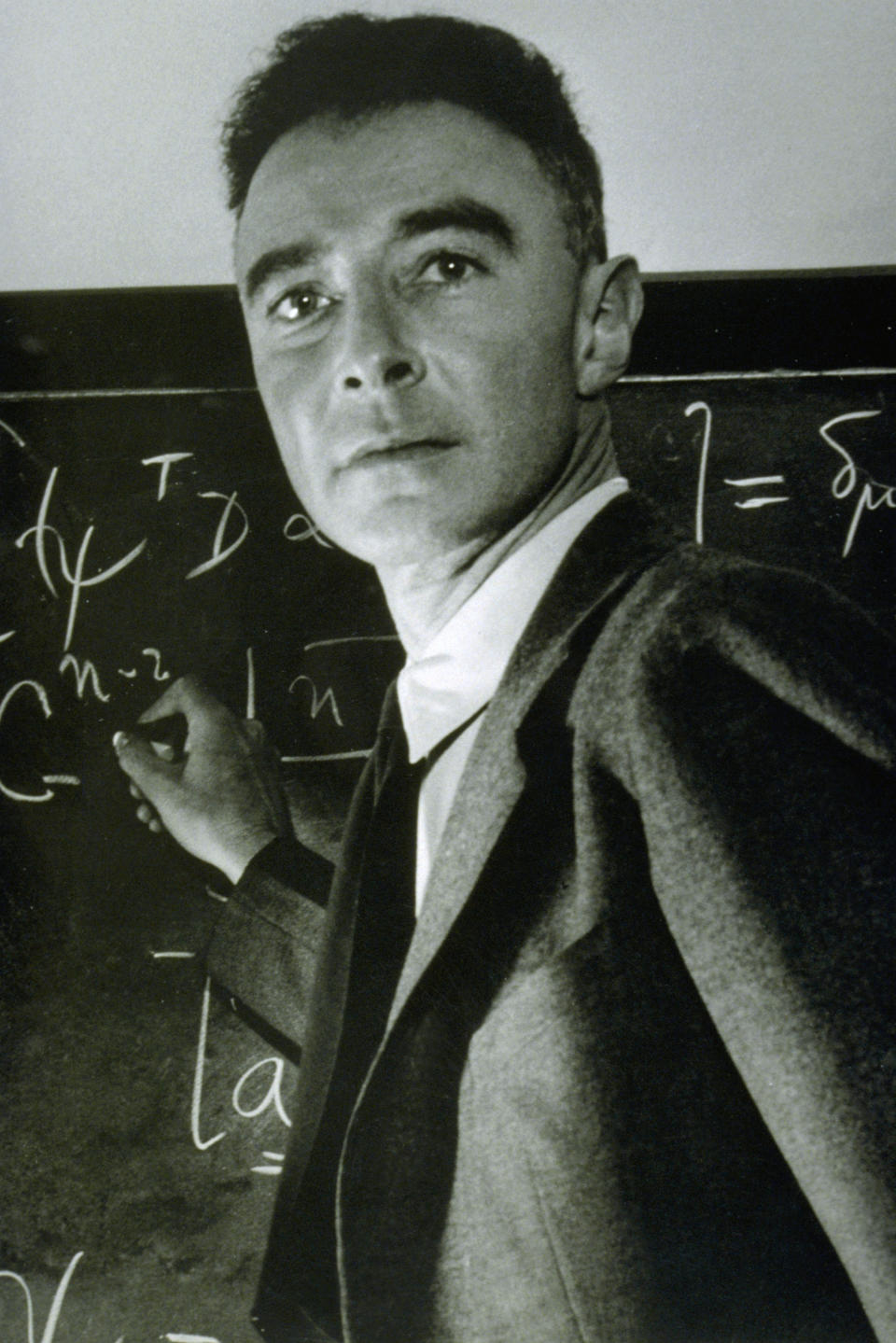
“They both were Jews, they both were leftists. Ted, all of 18 and 19 years old, seems to have had a much deeper understanding of the threat and danger posed by what they were creating than Oppenheimer did until after the bombing of Hiroshima and Nagasaki. And then Oppenheimer — it really kind of hit him like a ton of bricks,” James tells Deadline. “It’s understandable in some ways. Oppenheimer was in charge of this entire endeavor. He couldn’t afford to probably have the kind of misgivings that Ted could, but it is amazing to me that this young man — not even a man; he’s 19, a teenager — and with no access to the president or Gen. Groves [director of the Manhattan Project] or any of the upper echelons of what’s going on in the U.S. government, he gleaned what he gleaned to be the potential danger.”
That danger, in the eyes of the young Hall, was that a world in which one country – and one country only — controlled such an awesome weapon of mass destruction would be inherently dangerous and unstable. He could see – and there was evidence to support his view, given what the U.S. had done in Hiroshima and Nagasaki – that a nation possessing this capacity to the exclusion of all other countries would be inclined to use it.
“In my mind, this was a question of protecting the Soviet people as well as all people from wanton attack,” Hall explains A Compassionate Spy, “preventing an overall Holocaust that would affect the entire world, really.”
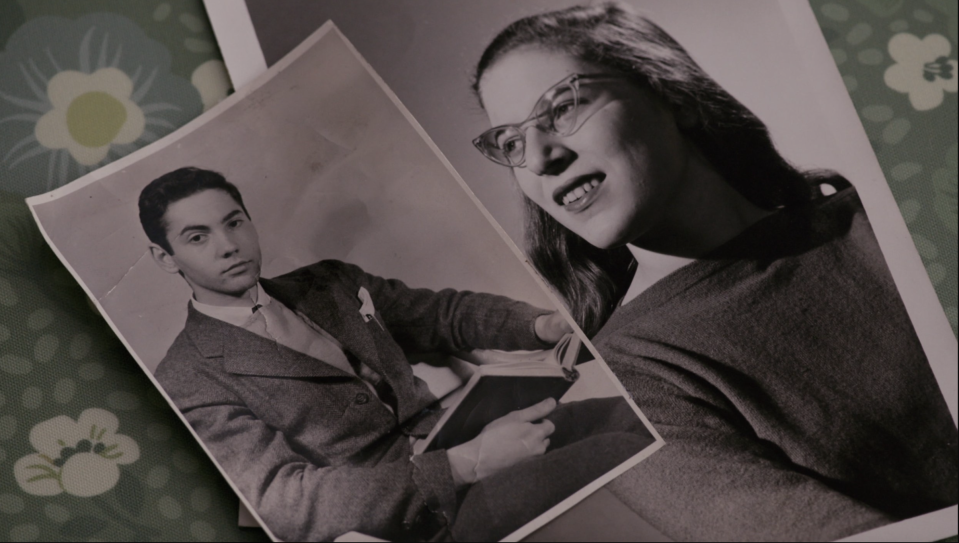
Hall’s remarks in the documentary come from interviews recorded shortly before his death in 1999. Remarkably, James was able to speak with someone who had intimate knowledge of Hall’s thinking – his wife Joan Krakover Hall, a brilliant woman in her own right. Ted and Joan met in Chicago after World War II, and fell intensely in love, their bond strengthened by a common sense of moral obligation to forge a more just world. They were married for more than 50 years before Hall’s death. The director interviewed her at her home in Cambridge, England in 2019 (she died just last month at the age of 94).
“I was just really taken with Joan and taken with what an amazing woman she was and this kind of amazing marriage that they’d had,” James says. “I came away from it saying to my colleagues, ‘This is certainly an espionage story, and it’s a story about geopolitics and World War II and the Bomb, but it’s also a love story.’ And I love the idea of sort of looking at these huge, important things in history through this lens of this couple.”
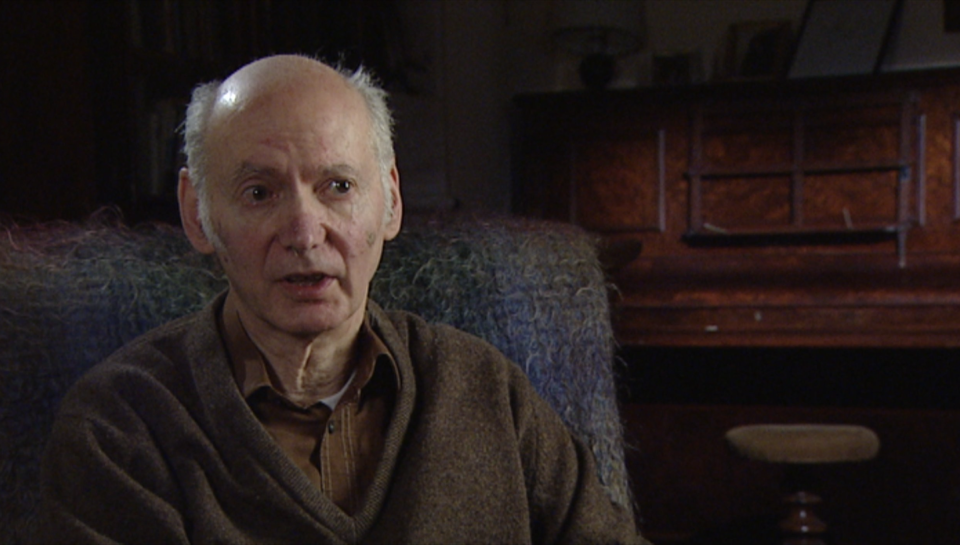
Ted Hall, in the archive interviews, appears a quiet and desiccated figure – bearing a resemblance to the Mr. Burns character in The Simpsons. He wasn’t incapable of humor, however, mentioning at one point, in reference to his Communist leanings, “I saw the world through rather pink-ishly colored glasses.” Joan, in her 90s, remained a dynamo with crystal clear recall. “She’s the firebrand in the couple,” James muses.
To visualize Joan and Ted’s recollections, James filmed dramatizations of their early years together and their close friendship with another young man, Saville “Savy” Sax, who had acted as a courier to transmit Hall’s information to the Soviets in the 1940s.
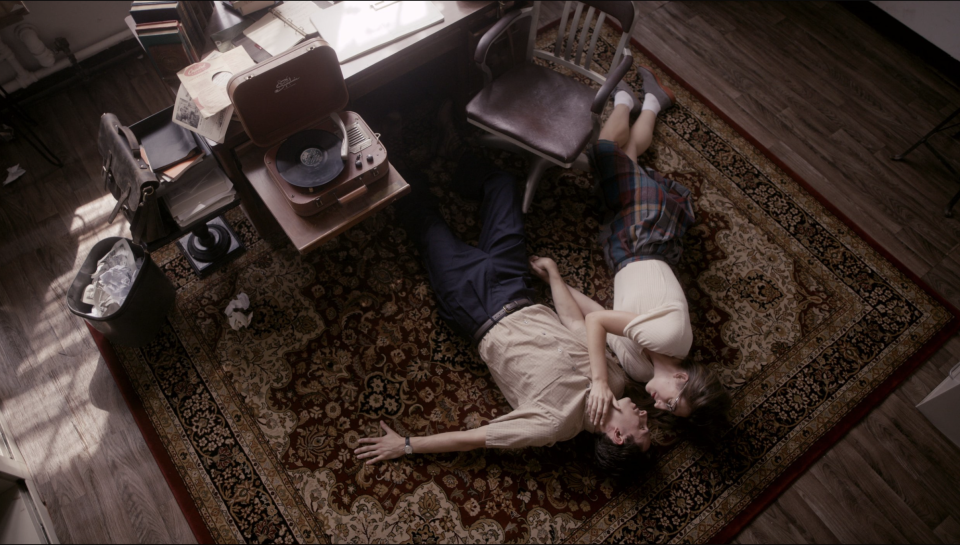
“I felt like it was essential to bring this story to life, because the stories that Joan and Ted are telling… they were so specific,” James says, “and in my mind, quite dramatic that there would be no way to bring them to life unless we did recreations.”
Among the scenes James dramatized was one where Joan, Ted and Savy realize government investigators are zeroing in on their espionage activities. They converse in a park in wintry Chicago, conscious that they’re being watched.
“We need to get the handlers a message,” Savy (Nicolas Eastlund) whispers anxiously. Ted (J. Michael Wright) responds tensely, “Take it one day at a time, but admit nothing.”
“We both realized that the risk was horrible,” Joan says of she and Ted. “I quail inside even now when I think how my parents would have reacted supposing that we were arrested.”

How can it be that neither Ted, Savy, nor Joan – who could have been considered an accessory after the fact because she knew what her husband had done – were never prosecuted? The film emphasizes that Julius and Ethel Rosenberg, who are described in the film as “small fish” compared to Ted, were executed for spying on behalf of the Soviet Union, but the Halls and Sax remained free.
To reveal the answer would constitute a spoiler. But it has to do with Ted’s older brother Ed, a genius-level engineer too; as a colonel in the Air Force he designed the intercontinental ballistic missile system.
“Even when [investigators] pressured [Ed] subsequently to provide information about his brother, he refused at risk to his own career,” James notes. “Talk about an incredible devotion between two brothers.”
A Compassionate Spy can be seen as a film about loyalty – between spouses, between two brothers, between a person and their ideals. Did Ted Hope owe more loyalty to his country, or to humanity, which he saw as imperiled by the U.S. holding a monopoly on atomic weaponry? That’s for an audience to decide.
Best of Deadline
2023 Premiere Dates For New & Returning Series On Broadcast, Cable & Streaming
SAG-AFTRA Interim Agreements: List Of Movies And Series Granted Waivers
Hollywood & Media Deaths In 2023: Photo Gallery & Obituaries
Sign up for Deadline's Newsletter. For the latest news, follow us on Facebook, Twitter, and Instagram.

